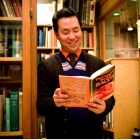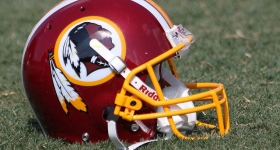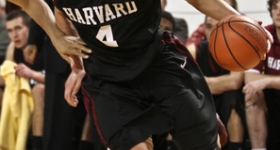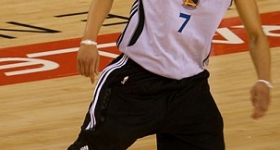Image by InterVarsity Christian Fellowship/USA.
Dear Jeremy Lin,
Hi. My name is Terry K. Park. I’m Mr. Hyphen 2011. That probably means
nothing to you, since you’re Mr. NBA 2012, King of New York, Emperor of the
Twitterverse. But I just wanted to introduce myself to you, from one
representative of the Asian American community to another, so you don’t think
I’m some random crazy person. To be honest, though, I’ve become a little crazy.
A little insane, actually. Okay I’ll say it.
You’ve made me Linsane.
Happy VaLINtine’s Day.
Wait! Please keep reading. I know you’ve been
getting a lot of love lately. From the press. From Spike Lee. From Mike D’Antoni
(and rightly so -- he owes you big time). And I read an article suggesting 10
New York celebrity women for you to date. But since you’re in Toronto tonight,
and no one attractive lives there, I wanted to make sure you had a Valentine’s
Day card to warm your heart, from someone who really appreciates you, who’s
been following you since your Harvard days.
Not literally following you. Don’t worry. I
have a life.
And that life, before I was infected with
Linsanity, consisted of being insane for the Utah Jazz.
The Utah Jazz? I know. It sounds weird. Allow
me to explain why the Jazz meant so much to me, and why you, now, mean so much
to me, on this day of VaLINtine’s.
When I was seven years old, my family moved to
Salt Lake City from San Jose, CA. A couple months after I arrived, my new
friends and I walked to the neighborhood 7-Eleven and saw, in the parking lot,
a massive black pick-up truck. We walked into the store and saw, standing at
the register, a massive black pick-up truck of a man. My friends pushed me
toward him and then hid in the candy aisle. Stumbling, I looked in front of me
and saw cowboy boots. I looked up, and up, and up, and a few minutes later when
I saw his face, I asked, “Are you Karl Malone?” He craned his neck down and
said to the midget Asian boy with the bowl cut, “Yeah.” I asked, “Can I have
your autograph?” “Yeah.” As my friends finally joined me to get their
autographs, Malone reached into his wallet, handed me a crisp five dollar bill,
and said, “Here, go buy yourself a Big Gulp.” I gulped.
Soon after, Malone, along with his perennial
pick-and-roll partner, John Stockton, adorned my bedroom wall. I quickly grew
to love -- obsess over -- the Jazz. Not because their star power forward paid
me five dollars for my allegiance, but because the team’s presence made me feel
like I belonged in a state where I felt incredibly, desperately, alone. I could
watch Jazz telecasts and be a loyal Jazzman like everyone else, no longer a
short Korean American kid constantly betrayed by the pungent food in his
fridge, the heavy accent in his immigrant mother’s English, and the non-white,
non-Mormon face in his bathroom mirror. I had no one to cheer for on the TV
screen who looked like me (I didn’t play tennis, so Michael Chang didn’t
count), so I might as well cheer for the local team and their superstars: one
black, one white. But it wasn’t enough just to cheer anonymously for the Jazz; I
wanted to prove I belonged by excelling on several athletic fields, including the
basketball court.
I thought that if I patterned my game after
Stockton’s pass-first, team-first style of play, I would pass. Not quite. Even though I played well for my Junior Jazz
teams, was selected to several all-star teams at the basketball camp of
University of Utah Coach Rick Majerus, I felt that I was either hypervisible as
a racial oddity or an invisible man whose skills were ignored. One particular
moment at Coach Majerus’s basketball camp dramatized these two feelings
simultaneously. We were all seated on the floor of the Huntsmen Center while
Coach Majerus demonstrated how to set a solid pick for a pick and roll: “When
you set a pick on your man, don’t take Chinese steps” -- taking clipped,
hesitant, pitter-patter steps -- “take real steps” -- taking long, more assured
strides. Immediately, everyone in the
entire arena turned their heads and looked at the only Asian American kid in
the entire basketball camp. Yup, me.
Little did I know that someone about my height,
with my complexion, and with much better skills, had probably felt much more
alone, on that same court, in that same city, in that same state. In 1944, as Japanese
Americans were interned at camps like Topaz in Utah, Wat Misaka, a 5’7’’, 150 lb Japanese American
point guard from Ogden, led the University of Utah to their only NCAA
championship at Madison Square Garden. Three years later, Misaka led the
underdog Utes back to MSG for the title game of the more prestigious National
Invitational Tournament against the University of Kentucky, coached by the
legendary Adolph Rupp. Stated the New
York Times on March 25, 1947: “Little Wat Misaka, American born of Japanese
descent, was a cute fellow intercepting passes and making the night miserable
for Kentucky.” That “cute fellow” held Ralph Beard, arguably the best college
player that year, to one single point. Several days later, Wat was drafted in
the first round by the Knicks -- the first Asian American to play in the NBA.
If I had known then about Misaka and his heroics,
maybe I would’ve felt less alone and more proud to be Asian in Utah and in the
US. But I didn’t. And so, as I later moved to Korea, to New York,
and back to California, I maintained my love for the Jazz, while scouring the
internet for news of any Asian American sports stars, and finding very
little. Even as I entered the academic
world and understood that my shame that day at Majerus’s camp and my burning
desire to find an Asian American male sports star indicated my problematic investment
in dominant modes of masculinity, I still yearned for an athletic face and body
that looked like mine, who didn’t take “Chinese steps,” but manly “Majerus”
steps.
That’s why I was so glad when I found out that
the star of Harvard’s basketball team was an athletic 6’3’’, 205 lb Chinese
American point guard from Palo Alto. I loved watching YouTube clips of your
dunks against UConn and your drives against Georgetown. I was a little disappointed
(though not surprised) when you went undrafted in 2010, but was ecstatic when
you outplayed John Wall in the summer league and signed with the Golden State
Warriors. I felt bad for you that the Oracle Arena crowd erupted whenever you
entered the game and touched the ball (even though I did just that when I
watched you play against my Jazz -- sorry), and even worse when it was clear that
you would never get regular playing time behind Monta Ellis and Stephen Curry. I
was sad to hear you were cut by the Warriors and Rockets at the beginning of
this season, but glad that the Knicks gave you a chance.
And then, last week, playing against the New Jersey Nets and their star point guard, Deron Williams
(whom I used to cheer for when he played for my Jazz), you were finally freed
from the end of the bench to score a shocking 25 points and 7 assists in a Knicks
win… and I couldn’t believe my eyes or my ears, as the famously fickle MSG
crowd chanted “Jeremy Lin” in the same arena where, almost sixty five years
before, they chanted “Wat Misaka.” Your next game, to prove that you weren’t a
one-game wonder, was against my Jazz. I picked up my good friend Taiyo Na, musician/actor and a native New
Yorker, and we watched the game at The Go Sports Bar in Old Oakland. At that
bar was fellow native New Yorker Eddie Kochiyama, son of legendary activist Yuri Kochiyama. Taiyo
invited him to our table. We then watched you take Chinese steps all over the
court to the tune of 28 points, 8 assists, and another improbable Knicks
victory. For the first time in my life, I rooted against the Jazz. For the
first time in my life, I had someone to root for.
Thanks, Jeremy.
Candy Hearts and Jump Shots,
Terry










Comments